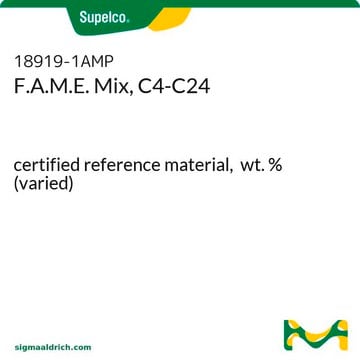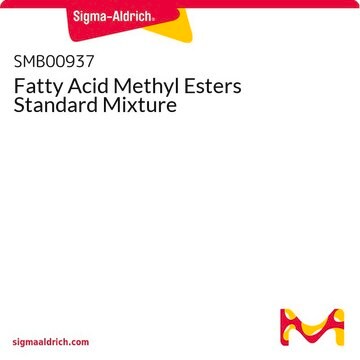89764
Undecanoic acid
analytical standard
Synonyme(s) :
Hendecanoic acid
About This Item
Produits recommandés
Qualité
analytical standard
Niveau de qualité
Pureté
≥99.0% (GC)
Durée de conservation
limited shelf life, expiry date on the label
Technique(s)
HPLC: suitable
gas chromatography (GC): suitable
Point d'ébullition
228 °C/160 mmHg (lit.)
248-250 °C (lit.)
Pf
28-31 °C (lit.)
Application(s)
cleaning products
cosmetics
flavors and fragrances
food and beverages
personal care
Format
neat
Groupe fonctionnel
carboxylic acid
Conditions d'expédition
ambient
Température de stockage
room temp
Chaîne SMILES
CCCCCCCCCCC(O)=O
InChI
1S/C11H22O2/c1-2-3-4-5-6-7-8-9-10-11(12)13/h2-10H2,1H3,(H,12,13)
Clé InChI
ZDPHROOEEOARMN-UHFFFAOYSA-N
Vous recherchez des produits similaires ? Visite Guide de comparaison des produits
Description générale
Application
Code de la classe de stockage
11 - Combustible Solids
Classe de danger pour l'eau (WGK)
WGK 1
Point d'éclair (°F)
>233.6 °F
Point d'éclair (°C)
> 112 °C
Équipement de protection individuelle
dust mask type N95 (US), Eyeshields, Gloves
Faites votre choix parmi les versions les plus récentes :
Déjà en possession de ce produit ?
Retrouvez la documentation relative aux produits que vous avez récemment achetés dans la Bibliothèque de documents.
Les clients ont également consulté
Notre équipe de scientifiques dispose d'une expérience dans tous les secteurs de la recherche, notamment en sciences de la vie, science des matériaux, synthèse chimique, chromatographie, analyse et dans de nombreux autres domaines..
Contacter notre Service technique











